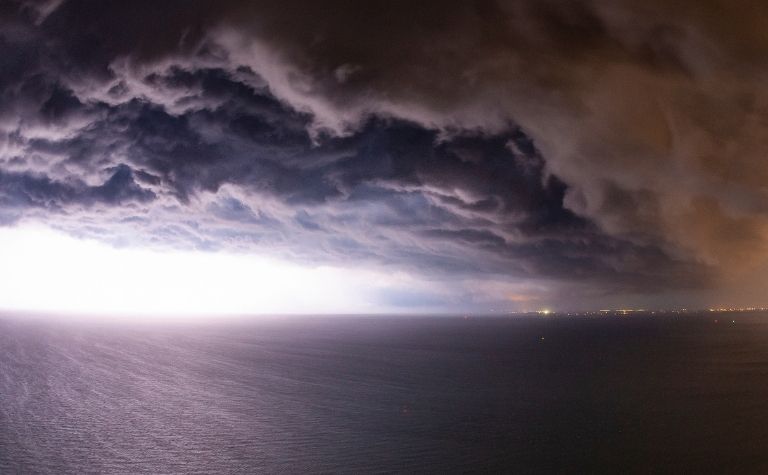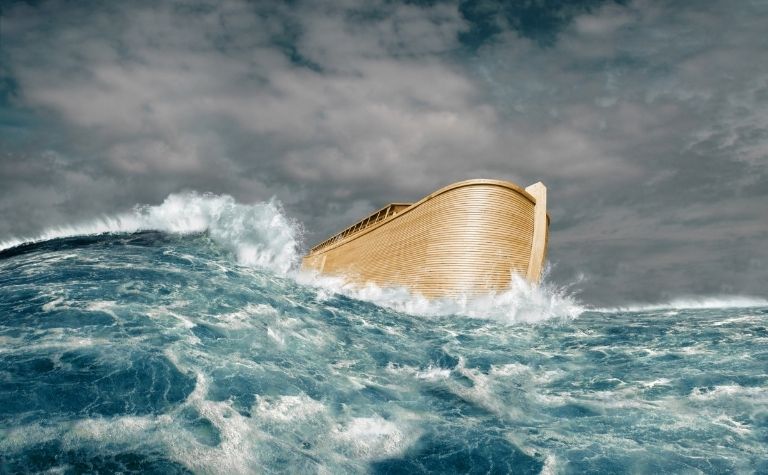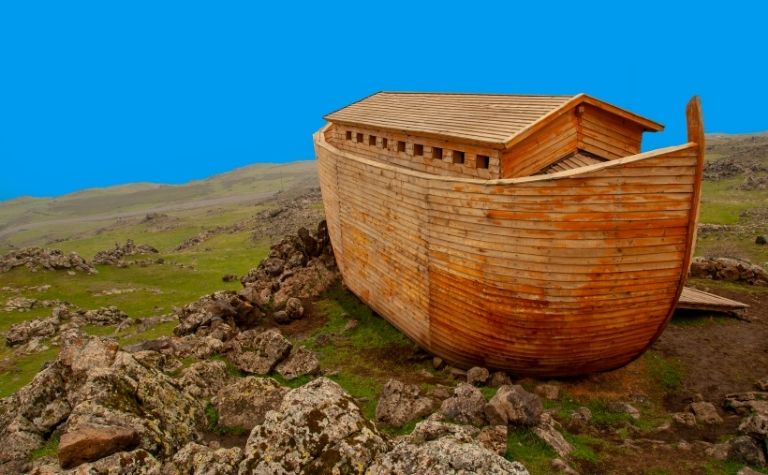What would cause God to destroy the world he created and called “very good” (Gen. 1:31)? Why would he undo his separation of the seas and the land? Why would God drown the human and animal life he fashioned for his glory? The flood story is one of the most powerful narratives in the Bible and solicits important questions from readers. One common question concerns why God flooded the earth.
God destroyed the world with a flood because of the potent and pervasive nature of sin that permeated the human race at the time. Sin enabled evil to conquer people’s minds, hearts, and actions. As a result, God regretted that he made people and decided to destroy the world with a flood.
How does Genesis describe God’s reason for sending the flood? How did God react internally to the sin in the world? What was his external reaction? What does the New Testament say about God’s reasons for judging the earth with water? Keep reading to learn the answers to these questions and others.
Also see How Many Animals Were on the Ark? to learn more.

The Reason Why God Flooded the Earth
Adam and Eve’s disobedience in the Garden of Eden introduced sin to the human race (Gen. 3). When the first couple reproduced, their children inherited a sinful nature from them, infamously illustrated in Cain murdering Abel (Gen. 4). As Adam and Eve had children, and as their children had children, and as generations died and were born (Gen. 5), the world became not only filled with people but with sinners.
A critical turning point in the early chapters of Genesis occurs in chapter six, which marks the beginning of the flood story. The opening scene of the narrative depicts a world completely and utterly ruined because of sin. Before water engulfed the earth, sin did. Before water ended lives, sin did.
The unparalleled manifestation of sin before the flood was expansive and pervasive. Genesis 6:5 reads, “The Lord saw that the wickedness of man was great in the earth and that every intention of the thoughts of his heart was only evil continually” (ESV). One Genesis scholar writes, “What God saw was both the extensiveness of sin and intensiveness of sin. Geographically, the problem is an infested earth.” [1]
God flooded the earth because people’s wickedness was great
The descriptive term “wickedness” comes from a Hebrew word (rah), meaning bad or evil. The verse describes the wickedness as “great.” The degree of depravity in the world before the flood is evident in the preceding verses, which describe the sin of the sons of god and the daughters of men (Gen. 6:1-4). The frequency and potency of sin in the pre-flood world resulted in God’s judgment.
God flooded the earth because people’s hearts were evil
People behaved in sinful ways because sin poisoned their hearts. Verse five not only reveals that the thoughts of people’s hearts were evil, but they were so completely (“every,” ESV) and perpetually (“continually,” ESV). In other words, their hearts weren’t sometimes evil or occasionally sinful. Not one thought of their hearts was pure, righteous, or holy — ever.
Also see Who Helped Noah Build the Ark? to learn more.

What did God feel in relation to the sin in the world?
Genesis 6:5 explains the evil extent of the human condition, and verses six to eight describe God’s response to it. One Genesis scholar writes, “This paragraph is an expose on the degeneracy of the human heart. Collectively, society has decayed beyond recovery in God’s estimation… Our passage provides a window into the heart of the troubled Creator.” [2]
Verse five (above) says God “saw” people’s wickedness. Verse six says he “regretted” making people. And verse seven describes what God “said” in response to what he saw and felt.
God reacted to people’s wickedness internally before externally inundating the earth with floodwaters. His response was strong and intense, just like the sin in the world that so displeased him. When sin came into the world, Adam and Eve experienced pain as a consequence.
In the world before the flood, God felt the pain of sin, though not as one who was guilty of it, but as one who mourned over the ruined world that he once called “very good” (Gen. 1:31).
| Translation | Genesis 6:6 |
|---|---|
| ESV | And the Lord regretted that he had made man on the earth, and it grieved him to his heart. |
| KJV | And it repented the Lord that he had made man on the earth, and it grieved him at his heart. |
| NASB | The Lord was sorry that He had made man on the earth, and He was grieved in His heart. |
| NIV | The Lord regretted that he had made human beings on the earth, and his heart was deeply troubled. |
| NLT | So the Lord was sorry he had ever made them and put them on the earth. It broke his heart. |
The key Hebrew word in the verse (yinnahem) means to be sorry, repent, or change one’s mind. Bible commentators and theologians debate the implications of this description in relation to God’s nature and character. Yet there is consensus among Genesis scholars that the term doesn’t teach that God sinned in any way, even though the term “repent” in particular often refers to wrongdoing for people.
Also see When Did Noah Build the Ark? to learn more.

How did God do in relation to the sin in the world?
As the passage moves from God’s internal response to his external one, it becomes clear that the punishment will fit the crime. If some readers think that God overreacted, they would be wise to remember that God is the standard of morality and justice in the world he created.
Next, Genesis reveals the consequences of people’s sin. The verse reads, “So the Lord said, ‘I will blot out man whom I have created from the face of the land, man and animals and creeping things and birds of the heavens, for I am sorry that I have made them.'” (Gen. 6:7).
The term “blot out” (ESV, NASB) comes from a Hebrew word (mhh) meaning to erase by washing, which is fitting for how God chose to judge sin, as the next part of the narrative reveals. Other translations render the term “wipe from the face of the earth” (NIV) or “wipe this human race” (NLT). Yet others translate it as “destroy” (KJV, NKJV).
The extent of the punishment would fit the crime. The flood story previously revealed that people’s wickedness was great “in the earth” (6:5). The offense wasn’t local, so the punishment wouldn’t be either. Sin had permeated “the face of the land”; so God would destroy people from “the face of the land.” The destruction would be so intense that all animals, except those God told Noah to save, would die.
5 New Testament verses that describe the cause of the flood
- People were obsessed with physical appetites: Luke 17:27 reads, “They were eating and drinking and marrying and being given in marriage, until the day when Noah entered the ark, and the flood came and destroyed them all.” (cf. Matt. 24:38)
- People had a general disregard for the sacredness of marriage: Matthew 24:38 reads, “For as in those days before the flood they were eating and drinking, marrying and giving in marriage, until the day when Noah entered the ark.” (cf. Luke 17:27)
- People were materialists: Luke 17:28 reads, “Likewise, just as it was in the days of Lot—they were eating and drinking, buying and selling, planting and building”
- People were faithless and unrighteous: Hebrews 11:7 reads, “By faith Noah, being warned by God concerning events as yet unseen, in reverent fear constructed an ark for the saving of his household. By this he condemned the world and became an heir of the righteousness that comes by faith.”
- People blasphemed God and rebelled against him: Jude14-15 reads, “It was also about these that Enoch, the seventh from Adam, prophesied, saying, “Behold, the Lord comes with ten thousands of his holy ones, to execute judgment on all and to convict all the ungodly of all their deeds of ungodliness that they have committed in such an ungodly way, and of all the harsh things that ungodly sinners have spoken against him.”
Also see How Many Sons Did Noah Have? to learn more.
References:
[1] The Book of Genesis: Chapters 1-17 by Victor Hamilton. p. 273.
[2] Genesis 1-11:26 by Kenneth Mathews. p. 339.
Related Questions
For many Bible readers, the story of Noah's ark never gets old. They are in awe when they read about the magnitude of the floodwaters, thankful when imagining how God saved the animals, and hopeful...
The story of Noah, the flood, and the ark is one of the most iconic narratives in the Bible. Not only does the magnitude of the floodwaters leave readers awe-struck, but so does the faith that Noah...
